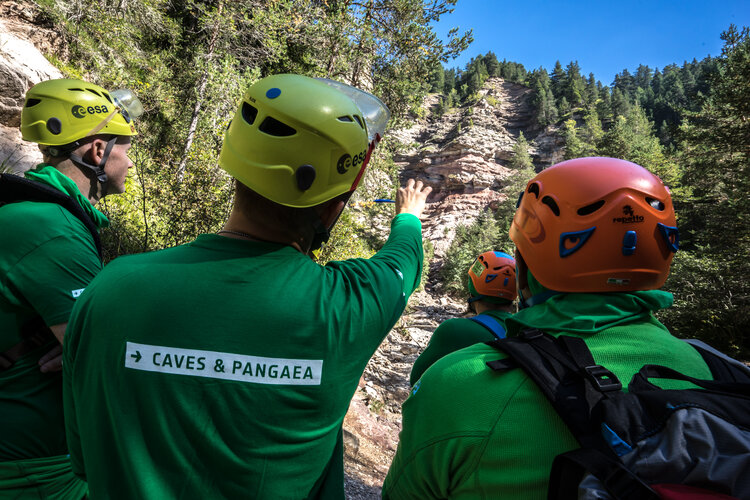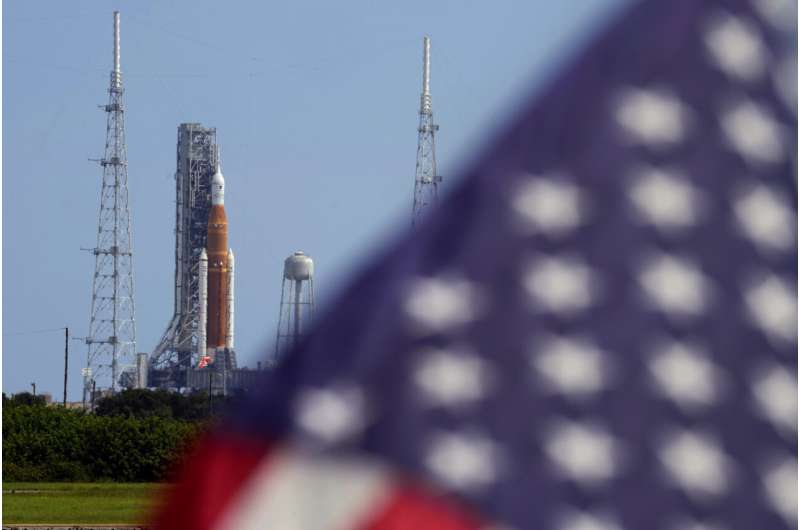
Copernical Team
Training astronauts to be scientists on the Moon

Astronauts with their sights on the Moon are receiving world-class geology training during the fifth edition of ESA’s Pangaea campaign. From choosing landing sites for a future Artemis mission, to designing science operations for the lunar surface, the course challenges space explorers to become field scientists.
Leak ruins NASA moon rocket launch bid; next try weeks away (Update)

NASA's new moon rocket sprang another dangerous fuel leak Saturday, forcing launch controllers to call off their second attempt to send a crew capsule into lunar orbit with test dummies.
NASA unsure next Moon rocket launch attempt possible this month
 After scrapping a second attempt to get its new 30-story lunar rocket off the ground due to a fuel leak, NASA officials said Saturday it may not be possible to try again this month.
The current launch window for NASA's Artemis 1 mission to the Moon ends Tuesday and is "definitely off the table," said Jim Free, associate administrator for Exploration Systems Development, at a press conference
After scrapping a second attempt to get its new 30-story lunar rocket off the ground due to a fuel leak, NASA officials said Saturday it may not be possible to try again this month.
The current launch window for NASA's Artemis 1 mission to the Moon ends Tuesday and is "definitely off the table," said Jim Free, associate administrator for Exploration Systems Development, at a press conference NASA will not try new Moon rocket launch attempt in coming days
 After scrapping a second attempt to get its new 30-story rocket off the ground due to a fuel leak, NASA announced on Saturday it will not try again during its current window of opportunity, which ends early next week.
Determined by the position of the Earth and Moon, the current launch period for NASA's Artemis 1 mission ends Tuesday and is "definitely off the table," said Jim Free, associat
After scrapping a second attempt to get its new 30-story rocket off the ground due to a fuel leak, NASA announced on Saturday it will not try again during its current window of opportunity, which ends early next week.
Determined by the position of the Earth and Moon, the current launch period for NASA's Artemis 1 mission ends Tuesday and is "definitely off the table," said Jim Free, associat Fuel leak ruins NASA's 2nd shot at launching moon rocket

NASA's new moon rocket sprang another dangerous fuel leak Saturday, forcing launch controllers to call off their second attempt to send a crew capsule into lunar orbit with test dummies.
NASA postpones rocket launch to Moon after fuel leak
 NASA on Saturday scrapped a second attempt to get its new 30-story rocket off the ground and send its uncrewed test capsule toward the Moon after engineers detected a fuel leak.
With millions around the globe and hundreds of thousands on nearby beaches waiting for the historic launch of the massive Space Launch System (SLS), a leak near the base of the rocket was found as ultra-cold liquid h
NASA on Saturday scrapped a second attempt to get its new 30-story rocket off the ground and send its uncrewed test capsule toward the Moon after engineers detected a fuel leak.
With millions around the globe and hundreds of thousands on nearby beaches waiting for the historic launch of the massive Space Launch System (SLS), a leak near the base of the rocket was found as ultra-cold liquid h Artemis I launch postponed

Update 3 September, 18:45 CEST: The Artemis I mission to the Moon has been postponed. NASA teams attempted to fix an issue related to a leak in the hardware transferring fuel into the rocket, but were unsuccessful. A news conference will follow with updates, watch via https://www.nasa.gov/nasalive.
Teams are moving forward to the Moon with a second launch attempt of the Artemis I mission on Saturday, 3 September. The two-hour launch window starts at 20:17 CEST (19:17 BST).
NASA Moon rocket ready for second attempt at liftoff
 After technical issues halted its first launch attempt, NASA will try again on Saturday to get its new 30-story rocket off the ground and send its unmanned test capsule towards the Moon.
If the massive Space Launch System (SLS) lifts off successfully, it will not only be awe-inspiring but also historic for NASA, marking the first of its Artemis program plotting a return to the Moon, fifty ye
After technical issues halted its first launch attempt, NASA will try again on Saturday to get its new 30-story rocket off the ground and send its unmanned test capsule towards the Moon.
If the massive Space Launch System (SLS) lifts off successfully, it will not only be awe-inspiring but also historic for NASA, marking the first of its Artemis program plotting a return to the Moon, fifty ye Skyroot Aerospace raises $51 Million led by GIC to propel the new future of small satellite launches
 Space-tech startup Skyroot Aerospace from India, successfully raised US$51 million Series-B funding round led by GIC, a leading global investment firm. This is the largest funding round ever in the Indian private Space-Tech sector, which validates Skyroot's strengths in space technology and helps meet the burgeoning demand from the international small satellite markets.
As part of the inve
Space-tech startup Skyroot Aerospace from India, successfully raised US$51 million Series-B funding round led by GIC, a leading global investment firm. This is the largest funding round ever in the Indian private Space-Tech sector, which validates Skyroot's strengths in space technology and helps meet the burgeoning demand from the international small satellite markets.
As part of the inve NASA says weather, SLS rocket look good for Artemis I launch on Saturday
 NASA says it will try again on Saturday to send its giant moon rocket and a space capsule to the moon and back - the first Artemis mission - after multiple problems that spoiled the first attempt were fixed.
The space agency was ready to launch Artemis I on Monday when fuel leaks and a problem with a core-stage main engine sensor led controllers to scrub the attempt.
NASA now s
NASA says it will try again on Saturday to send its giant moon rocket and a space capsule to the moon and back - the first Artemis mission - after multiple problems that spoiled the first attempt were fixed.
The space agency was ready to launch Artemis I on Monday when fuel leaks and a problem with a core-stage main engine sensor led controllers to scrub the attempt.
NASA now s 